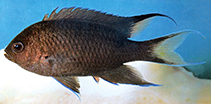| Family: |
Pomacentridae (Damselfishes), subfamily: Pomacentrinae |
| Max. size: |
5.41 cm SL (male/unsexed) |
| Environment: |
reef-associated; marine; depth range 1 - 10 m |
| Distribution: |
Eastern Indian Ocean: Western Australia. |
| Diagnosis: |
Dorsal spines (total): 13-13; Dorsal soft rays (total): 10-12; Anal spines: 2-2; Anal soft rays: 10-12; Vertebrae: 26-26. This species is distinguished by the following characters: D XIII,10-12 (usually 11); A II,10-12 (usually 11); pectoral-fin rays 17-19 (rarely 19); tubed lateral-line scales 16-19 (usually 17-18); total gill rakers on first arch 21-23 (usually 21-22); body depth 2.2-2.4 in SL; ventral margin of suborbital exposed (i.e. not hidden by scales); middle fin rays of dorsal and anal fins filamentous; dorsal and ventral margins of caudal fin filamentous; mainly dark brown in life except pale posteriormost parts of dorsal and anal fins and pale central portion of caudal fin; dark margins of caudal fin restricted to proximal half of fin; small dark spot at upper pectoral-fin base, but not extending into axil of fin (Ref. 117117). |
| Biology: |
This species is generally associated with rocky substrates with ample crevices and coral formations, utilized for shelter. These are captured from about 1-10 m, with considerable tidal fluctuation (10+ m), especially along the Kimberley coast. Usually in large aggregations, which feed well above the bottom on zooplankton (Ref. 117117).. |
| IUCN Red List Status: |
Not Evaluated (N.E.) Ref. (130435)
|
| Threat to humans: |
harmless |
Source and more info: www.fishbase.org. For personal, classroom, and other internal use only. Not for publication.
